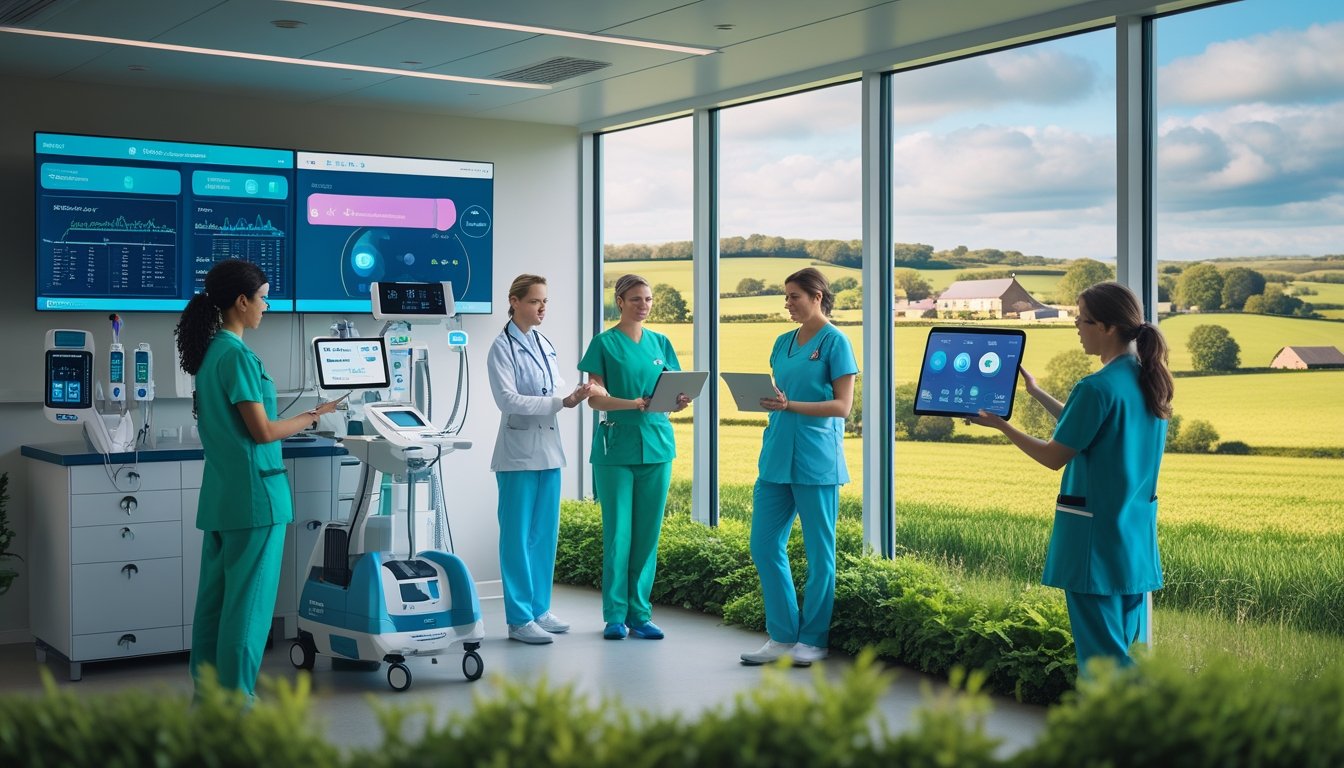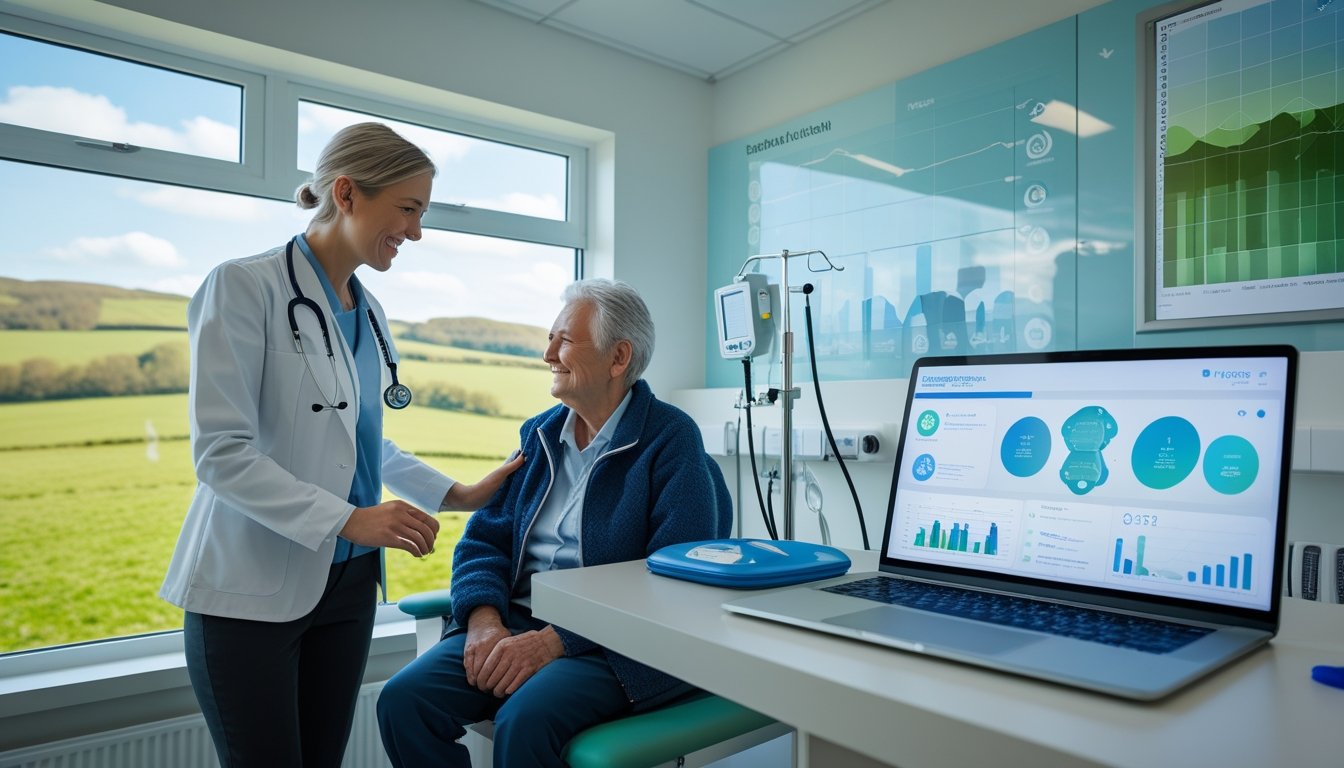Late updated: 06 Oct 2025 09:10
Written by: Oliver Bennett
AI Innovations In UK Rural Healthcare Solutions: Transforming Access and Efficiency
Artificial intelligence is making waves in the UK’s rural healthcare landscape, offering groundbreaking ways to improve both access and quality of care. With geographical isolation and limited resources posing long-standing challenges, AI presents an opportunity to overcome these barriers by enhancing diagnostic capabilities, streamlining operations, and optimising healthcare delivery. The integration of AI into rural healthcare solutions signifies a critical advancement in bridging the gap between underserved communities and the healthcare they need.

AI technologies are revolutionising rural medicine by applying advanced data analytics and machine learning to facilitate better health outcomes. These innovations can predict healthcare trends, manage patient data efficiently, and enable healthcare professionals to make informed decisions without the constraints of location. Our focus on harnessing AI enables rural populations to access high-quality care, empowering communities that have historically been marginalised in terms of healthcare services.
Key Takeaways
- AI bridges healthcare gaps in rural UK.
- Technologies improve diagnostics and access.
- Enhancements lead to better health outcomes.
Core AI Innovations in UK Rural Healthcare Solutions
AI has become pivotal in transforming rural healthcare in the UK by improving diagnostic accuracy, enabling virtual care, managing chronic diseases and optimising resource allocation. This has led to enhanced healthcare delivery and patient outcomes, even in the most underserved areas.
Enhancing Diagnostic Accuracy and Clinical Decision-Making
AI technologies are leading to significant improvements in diagnostic accuracy in rural healthcare. By integrating machine learning and natural language processing (NLP), medical professionals can now interpret complex data sets with greater precision. This includes detecting conditions like diabetic retinopathy earlier, allowing for timely interventions.
Additionally, AI-powered diagnostic tools are helping clinicians make informed decisions by analysing patient history, symptoms and test results efficiently. This accuracy not only speeds up the diagnostic process but also reduces the margin for human error, a vital factor in areas with limited access to specialists.
Expanding Access Through Telemedicine and Virtual Care
In rural settings where healthcare facilities are often scarce, telemedicine platforms enabled by AI are proving indispensable. These platforms bridge the gap between patients and healthcare providers, offering consultations and follow-ups through video calls or mobile health apps.
Machine learning algorithms help ensure these virtual care interactions are tailored to individual needs, analysing data patterns to offer personalised treatment recommendations. This is a game-changer for patients without the ability to travel long distances for care, ensuring they receive timely and efficient healthcare services.
Remote Monitoring and Chronic Disease Management
Remote monitoring technologies, often enhanced by IoT devices, allow for continuous tracking of patients' health metrics. This is particularly beneficial for managing chronic conditions such as diabetes, where constant monitoring is crucial.
AI facilitates the analysis of the collected data, enabling early detection of potential health threats and allowing healthcare providers to make proactive adjustments to treatment plans. This real-time monitoring ensures that patients receive consistent care, reducing hospital visits and improving quality of life.
Resource Allocation and Predictive Analytics
Resource allocation, a critical aspect of healthcare management, is being revolutionised by predictive analytics. AI models identify patterns and predict future healthcare needs, allowing resources to be allocated more efficiently.
In rural areas, where resources are limited, these analytics can prioritise patient care based on urgency and available facilities. This means healthcare services are better aligned with patient needs, reducing wait times and increasing service availability. Predictive models also forecast outbreaks or spikes in healthcare demands, ensuring preparedness and effective response strategies.
Implementation Challenges and Future Considerations in Rural AI Healthcare

As we innovate with AI in rural UK healthcare, we must address key challenges that influence ethical, legal, and infrastructure frameworks. The protection of patient data, efficient integration of technology, and establishment of robust ethical standards are pivotal. These considerations will lay the groundwork for AI to support improved healthcare delivery in underserved areas.
Ethical and Legal Frameworks
We face significant challenges developing ethical and legal frameworks for AI in rural healthcare. Establishing regulations that ensure patient rights while encouraging innovation is complex. Clear guidelines are essential to maintain trust among stakeholders and protect healthcare systems from misuse of technology.
Ethical considerations include addressing biases in AI algorithms that could affect health outcomes. Legal frameworks must adapt swiftly to encompass new technologies, ensuring they are used in a transparent manner. Collaboration with legal experts and healthcare professionals is vital to achieve this balance.
Data Privacy and Security
Ensuring data privacy and security is a primary concern in deploying AI in healthcare. Rural settings often lack robust systems to protect sensitive patient data from breaches. This makes it critical for us to develop strong cybersecurity measures to safeguard information and maintain patient trust.
AI solutions must comply with regulations like GDPR, focusing on data minimisation and anonymisation techniques. We must also prioritise educating healthcare staff about best practices in handling data securely. Implementing stringent protocols will play a crucial role in preventing unauthorized access and potential data breaches.
Digital Infrastructure and Workforce Integration
Digital infrastructure in rural areas presents challenges in AI implementation. Connectivity issues and inadequate tech support can hinder progress. Upgrading digital infrastructure is necessary to facilitate seamless AI integration and ensure consistent health care delivery.
Our workforce also requires training to work effectively with AI systems. Professionals need to be skilled in operating new technologies, interpreting AI outputs, and understanding limitations. Partnerships with educational institutions can support ongoing training and development. By focusing on building digital resources and a capable workforce, we can enhance health services in rural communities.
Frequently Asked Questions

Incorporating artificial intelligence into rural healthcare systems in the UK has brought about transformations in accessibility, diagnostic accuracy, and chronic disease management. These changes demonstrate AI’s potential in addressing prevalent challenges in healthcare provision within rural communities.
How are artificial intelligence technologies being tailored to support remote rural healthcare providers?
Artificial intelligence technologies are customised to address the distinct challenges faced by rural healthcare providers. AI systems are designed to analyse limited data efficiently and facilitate remote consultations to bridge the gap in specialist availability. This helps in optimising workforce deployment and enhancing service delivery in remote areas, ensuring that healthcare services reach those most in need.
What are the emerging AI-driven mobile health solutions for rural areas in the UK?
AI-driven mobile health solutions are becoming increasingly prominent as they leverage machine learning and data analytics to provide personalised health interventions. These mobile platforms enable remote monitoring and consulting services, which are vital in rural regions with limited access to healthcare infrastructure. By extending medical services to patients’ homes, these solutions play a critical role in proactive healthcare management.
In what ways is AI contributing to the improvement of diagnostic accuracy in UK's rural healthcare settings?
AI contributes significantly to improving diagnostic accuracy by employing advanced algorithms to interpret medical imaging and patient data more precisely. AI tools assist healthcare professionals in identifying patterns that may not be immediately apparent, reducing the risk of diagnostic errors. This technological support allows for timely and accurate detection of medical conditions, which is crucial in rural settings with limited specialist resources.
What role does AI play in managing chronic diseases for patients in rural parts of the UK?
AI facilitates the management of chronic diseases through continuous monitoring and personalised treatment plans. It enables healthcare providers to track patient health metrics in real-time, offering insights that inform more effective interventions. This ongoing oversight assists in better management of conditions such as diabetes and hypertension, improving patient outcomes and quality of life.
How is patient data privacy being addressed in the implementation of AI in rural UK healthcare systems?
Ensuring the privacy of patient data is paramount in any AI deployment. AI systems are integrated with robust encryption and data protection measures to comply with UK data protection regulations. Continuous audits and transparent data handling policies are vital to maintaining trust, protecting patient information, and ensuring ethical standards are upheld in every aspect of AI application.
What impact has artificial intelligence had on the availability of specialist care services in the UK's rural communities?
AI has expanded the reach of specialist care services in rural communities by enabling virtual consultations and diagnostic support. These technologies bring specialists virtually to patients who might otherwise need to travel long distances for care. This increased access to specialist advice leads to improved healthcare outcomes and a more comprehensive service offering in rural healthcare settings.
